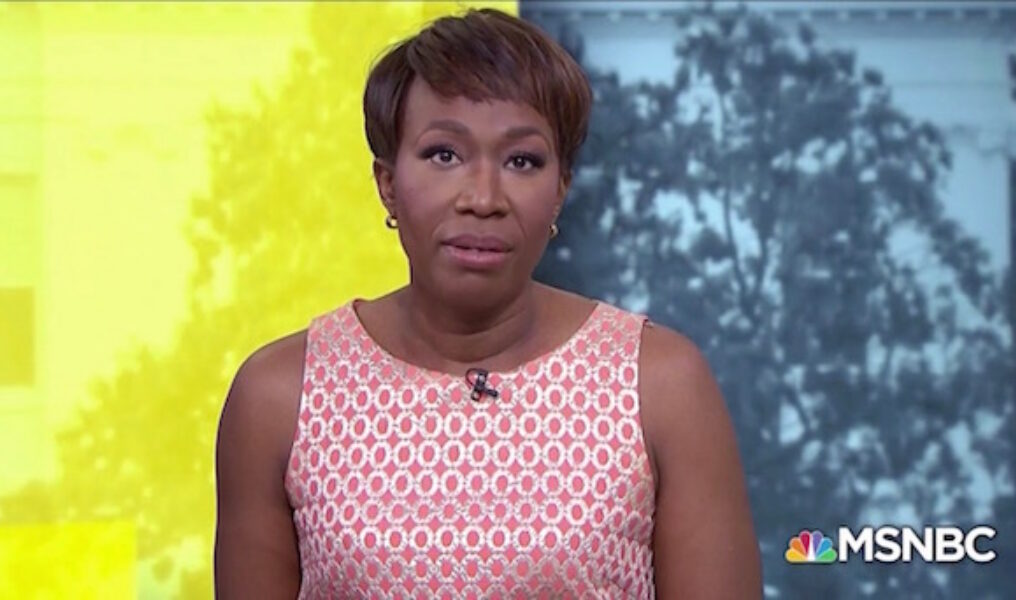Perhaps this is what is meant by the phrase "standing in your truth." MSNBC anchor Joy Reid's opening to her popular AM Joy Saturday morning show was riveting. No frills, no fanfare, no histrionics. Just Joy-Ann Reid looking into the camera for four minutes addressing the tornado of controversy whipping around her after the revelation of ten year old homophobic and transphobic tweets and blog posts.
"Good morning and welcome to AM Joy. A community that I support and that I deeply care about is hurting because of some despicable and truly offensive posts being attributed to me. Many of you may have seen these blog posts circulating online and on social media. Many of them are homophobic, discriminatory and outright weird and hateful. When a friend found them in December and sent them to me, I was stunned, frankly. I couldn't imagine where they'd come from or whose voice that was," she said.
Reid had apologized late last year for a slew of blog posts from her days as a Florida radio morning talk show host and blogger. But, as the Los Angeles Blade reported Thursday, the second batch of posts and tweets were construed as considerably more homophobic and transphobic than the first batch—and Reid said she did not recognize them. She hired a cybersecurity expert and turned the matter over to federal law enforcement—the FBI is now investigating whether or not her old posts were somehow digitally manipulated.
Because of her strong support as an ally, some LGBT people accepted her surprise and reluctance to automatically apologize while others insisted the Wayback Machine that archived the old posts couldn't be hacked and that she was lying to cover up her humiliating homophobia to save her career.
Saturday morning, Reid stood metaphorically naked to explain the truth as she sees it and apologize for the hurt her words have caused.
"In the months since [December], I've spent a lot of time trying to make sense of those posts. I hired cybersecurity experts to see if someone had manipulated my words or my former blog. The reality is, they have not been able to prove it," Reid said. "But here's what I know. I genuinely do not believe I wrote those hateful things, because they are completely alien to me. But I can definitely understand based on things I have tweeted and have written in the past why some people don't believe me. I have not been exempt from being dumb, or cruel, or hurtful to the very people I want to advocate for. I own that, I get it, and for that I am truly, truly sorry."
Reid noted how an LGBT advocate and friend from Florida called her out for transphobia in tweets about right-wing pundit Ann Coulter, who she had mocked using transgender stereotypes.
"I apologized to my friend and I want to apologize to the trans community and to Ann," Reid said. "Those tweets were wrong and horrible. I look back today at some of the ways I've talked casually about people and gender identity and sexual orientation and I wonder who that even was. But the reality is that like a lot of people in this country, that person was me."
Reid talked about growing up in a household with conservative views on LGBT issues and people, which she reflected.
"I'm heartbroken that I didn't do better back then," she said, acknowledging how difficult it is to come out, "to just walk around in the world, especially for trans people. And I feel like I should have known better than to ever write or tweet in a way that could make fun of, or make light of, or make light of that pain and that experience. Even a decade ago, when the country was in a very different place. But I cannot take any of that back. I can only say that the person I am now is not the person I was then," Reid said.
"The reality is that I have to own the things I have written and tweeted and said. And I'm hoping that out of all of this, there's an opportunity to talk about the ways in which hurtful speech really does imperil marginalized communities. These issues matter, not just theoretically, but because we're talking about our friends, our kids, our co-workers. People who deserve better than what I have sometimes given them," Reid said. (See the video and full transcript of her remarks below).
For about 36 commercial-free minutes, Reid and a panel of LGBT friends and community representatives—who she invited to "feel free to grill me, you have absolutely the right to do that"—talked about how words hurt and matter, especially in this era where LGBT rights are being rolled back and hate crimes are going up.
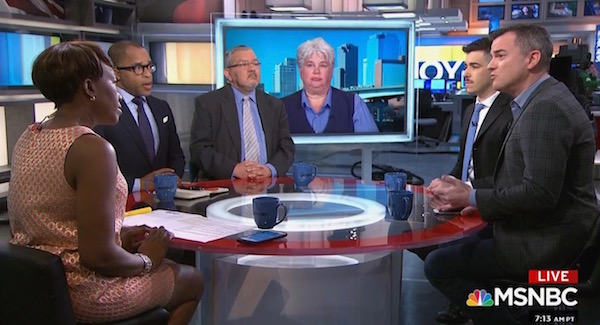
The panel was sizable: her friend, Jonathan Capehart, opinion columnist for The Washington Post; Diego Sanchez, PFLAG's Director of Advocacy, Policy and Partnership; Chase Strangio, staff attorney at the ACLU's LGBT and HIV Project, who's appeared several times on her shows; Zeke Stokes, Vice President of Programs for GLAAD; Sarah Scanlon from Arkansas, who did LGBT Outreach for the Bernie Sanders 2016 campaign; as well as other frequent AM Joy guests – Danielle Moodie-Mills, host of Woke AF, on Sirius XM Radio; Brandon Wolf survivor of the Pulse Nightclub massacre and Vice President of the Drew Project; and Jose Antonio Vargas, undocumented founder and CEO of Define American
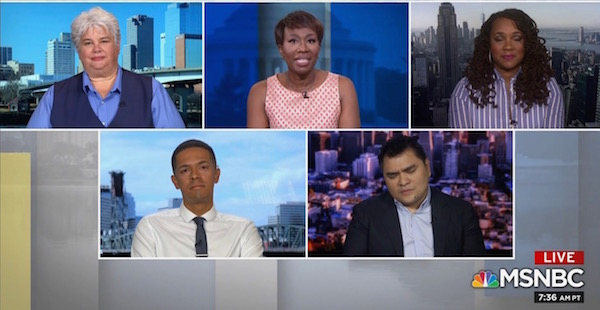
Reid started the discussion with her "dumb" tweeting about Coulter that "mocked the trans identity." How does this "land in the real world," she asked Strangio, "for people who are experiencing this in their real lives?"
"Using anti-trans, trans-antagonistic is part of the cultural discourse we hear all the time and it contributes to the trauma in the trans community, it contributes to the high rates of violence, all of the discrimination that trans people experience," Strangio said. "And none of us are immune from that – whether we're trans, whether we're LGBT. And so what I want us to really gain from this dialogue is that the work of unpacking the internalization of anti-black language, anti-language is life-long work—work that we have to do and participate in every day and that's what I hope we all learn from this."
Noting Reid's growing popularity and what's at stake for her reputation, Variety suggested the segment was strategically aimed PR crisis management.
Reid borrowed "a play that appears to have worked for HBO host Bill Maher, who faced a similar imbroglio in 2017 after he uttered a racial epithet on his 'Real Time' program," Brian Steinberg wrote. "In the aftermath, Maher convened guests like Ice Cube and Michael Eric Dyson to call him to task for using the slur and explore the issues about its use."
But what bled through the television was not sharpened stinging criticism but a heartfelt response, closer to home, with longtime LGBT friends like Capehart seeming to choke back tears in pauses that seemed eternal. Those seconds of real dead air on TV were deeper than any pause in a profound Harold Pinter play.
"The beauty of what you did at the open was put into context where society was," Capehart said. "I wouldn't even be talking to my own mother if she had not evolved…. Only a stone cold heart could not change."
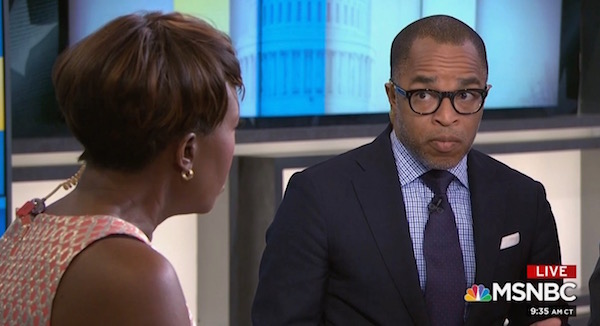
Pause. "Joy, when this happened, I was hurt. But not by anything that was attributed to you. I was hurt because the Joy I know and have known for probably more than 10 years, certainly before all of this stuff – is not the Joy that I know. The Joy that I know is someone who stands by me personally, stands by me and my husband, stands by me and my community," Capehart said, looking sincerely into the eyes of his friend. "I don't know a better place for me to be right now than to sit in the chair next to you."
Capehart also chastised Reid's critics as "people out there watching because it's like the Coliseum for them—I mean they want to see you eviscerated. But for those who have not evolved, for those who have not changed, for those who are waiting for you to crumble and for everyone to reign down condemnation on you – good luck with that. Change your hearts. [To camera] Evolve. Just like the rest of the country."
But Strangio added: "I think we have to hold the reality that we can't be looking for people that we love to be our heroes and be perfect. We are all flawed and the trauma of our mistakes hurts other people and we have to own that and the reality is that evolution is what we should strive for but we should also not be trying to look for perfect human heroes because they do not exist and we have to hold the complexity and the pain and the trauma that we all carry in the world."
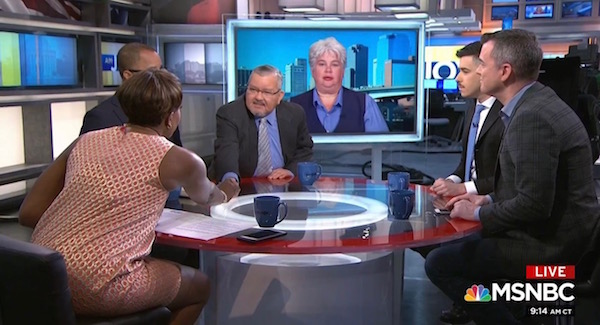
Sanchez also reminded the group, and by extension that the very conversation they were having "is a luxury," in terms of the day-to-day lives for so many. When the phone rings at PFLAG, he said, people ask basic question about how to find a grocery store "because I can't walk in safely."
Reid used that to note the degree of danger that exists for LGBT people.
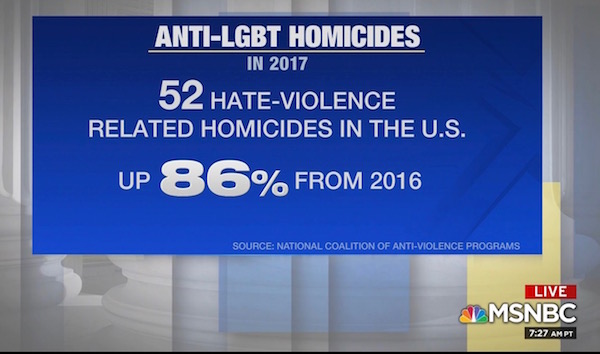
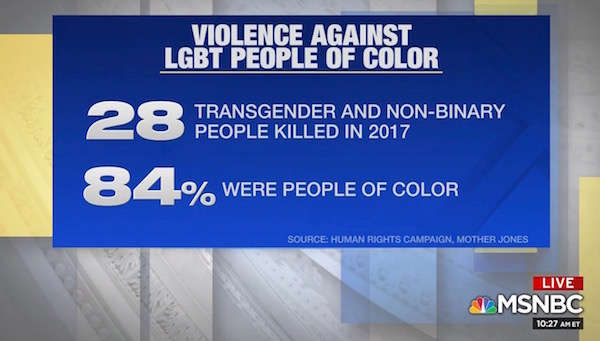
Moodie-Mills brought a note of levity but said she found it "problematic" that so many were jumping on Reid while the media give President Donald Trump "a complete and total pass on things that are coming out of his mouth right now."
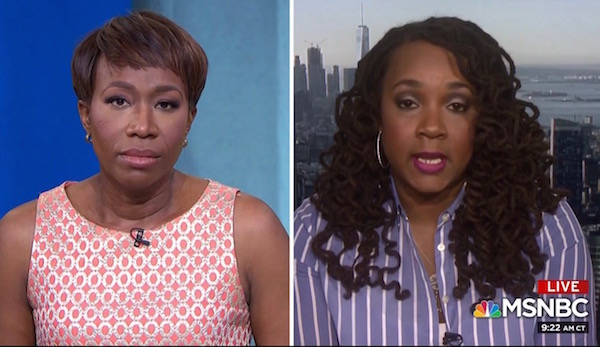
"So while I appreciate your apology," Moodie-Mills said, "I don't represent the gay community. Unfortunately, I'm not the queen of it. But the reality is that while we're having conversations about what may or may not have been said ten years ago, we should be having conversations about what was tweeted ten seconds ago and about how there are bans that are still up at the Supreme Court right now to keep Muslims out of America, that there are bans right now to kick patriotic trans people out of the military—and that's coming from the Oval Office right now, not ten years ago, not ten minutes ago, but right now."
The remarkable Rev. Dr. William Barber expressed his support at the end of his segment and Reid and her AM Joy show were both trending on Twitter, with an outpouring of support from colleagues and fans.
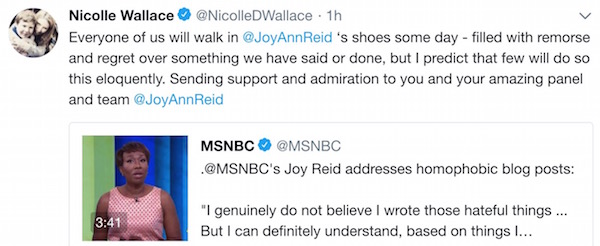
Will this apology be sufficient to silence Reid's critics, at least until the FBI concludes its investigation? Who knows. An Internet feeding frenzy does not require starvation for subject matter to consume. But for many in the LGBT community, for friend and advocate Joy-Ann Reid to lose her media platform over past homophobia and transphobia for which she has spectacularly publicly apologized would be a greater lose for the cause of LGBT equality.
Here's the full transcript of Reid's opening remarks, followed by video of the entire segment.
"Good morning and welcome to AM Joy. A community that I support and that I deeply care about is hurting because of some despicable and truly offensive posts being attributed to me. Many of you may have seen these blog posts circulating online and on social media. Many of them are homophobic, discriminatory and outright weird and hateful. When a friend found them in December and sent them to me, I was stunned, frankly. I couldn't imagine where they'd come from or whose voice that was.
In the months since, I've spent a lot of time trying to make sense of those posts. I hired cybersecurity experts to see if someone had manipulated my words or my former blog. The reality is, they have not been able to prove it. But here's what I know. I genuinely do not believe I wrote those hateful things, because they are completely alien to me. But I can definitely understand based on things I have tweeted and have written in the past why some people don't believe me. I have not been exempt from being dumb, or cruel, or hurtful to the very people I want to advocate for. I own that, I get it, and for that I am truly, truly sorry.
I had a conversation the other day with a friend who's also an advocate in the LGBTQ community in Florida who rightly took me to task for my tweets mocking Ann Coulter using transgender stereotypes. I apologized to my friend and I want to apologize to the trans community and to Ann. Those tweets were wrong and horrible. I look back today at some of the ways I've talked casually about people and gender identity and sexual orientation and I wonder who that even was.
But the reality is that like a lot of people in this country, that person was me.
I grew up in a household that, like many in America, had conservative views on LGBTQ issues. I had friends – some of my closest friends in fact, growing up – who I later learned were gay and had kept it secret from me and from everyone else we were close to. Because they didn't know what we would say or if we would still be friends or whether we would look at them differently.
I can remember a friend of mine my freshman year in college telling me he was gay – and my knee-jerk reaction being that it was so disappointing to the women he could have married. He was so hurt he didn't speak to me for months.
I'm heartbroken that I didn't do better back then. Knowing so many great people in the LGBTQ community, including amazing friends and journalists and producers and political operatives and great dads and moms and advocates and just regular people and knowing how hard it must have been for so many of them to come out, to their families to their friends, to just walk around in the world, especially for trans people. And I feel like I should have known better than to ever write or tweet in a way that could make fun of, or make light of, or make light of that pain and that experience. Even a decade ago, when the country was in a very different place. But I cannot take any of that back. I can only say that the person I am now is not the person I was then. I like to think that I have gotten better as a person over time, that I'm still growing. That I am not the same person I was ten or five or even one year ago. And I know that my goal is to try to be a better person, and a better ally.
The reality is that I have to own the things I have written and tweeted and said. And I'm hoping that out of all of this, there's an opportunity to talk about the ways in which hurtful speech really does imperil marginalized communities. These issues matter, not just theoretically, but because we're talking about our friends, our kids, our co-workers. People who deserve better than what I have sometimes given them.
And with that I want to introduce our panel. Joining me now is Jonathan Capehart, opinion columnist for "The Washington Post;" Diego Sanchez, Director of Advocacy, Policy and Partnership at PFLAG, an organization for families and allies of the LGBTQ community; Chase Strangio, staff attorney at the ACLU's LGBT and HIV Project; and Zeke Stokes, Vice President of Programs for GLAAD; and Sarah Scanlon who worked on LGTB Outreach for the Bernie Sanders 2016 campaign."
VIDEO:
This article originally appeared in the Los Angeles Blade and is made available in partnership with the National LGBT Media Association.
